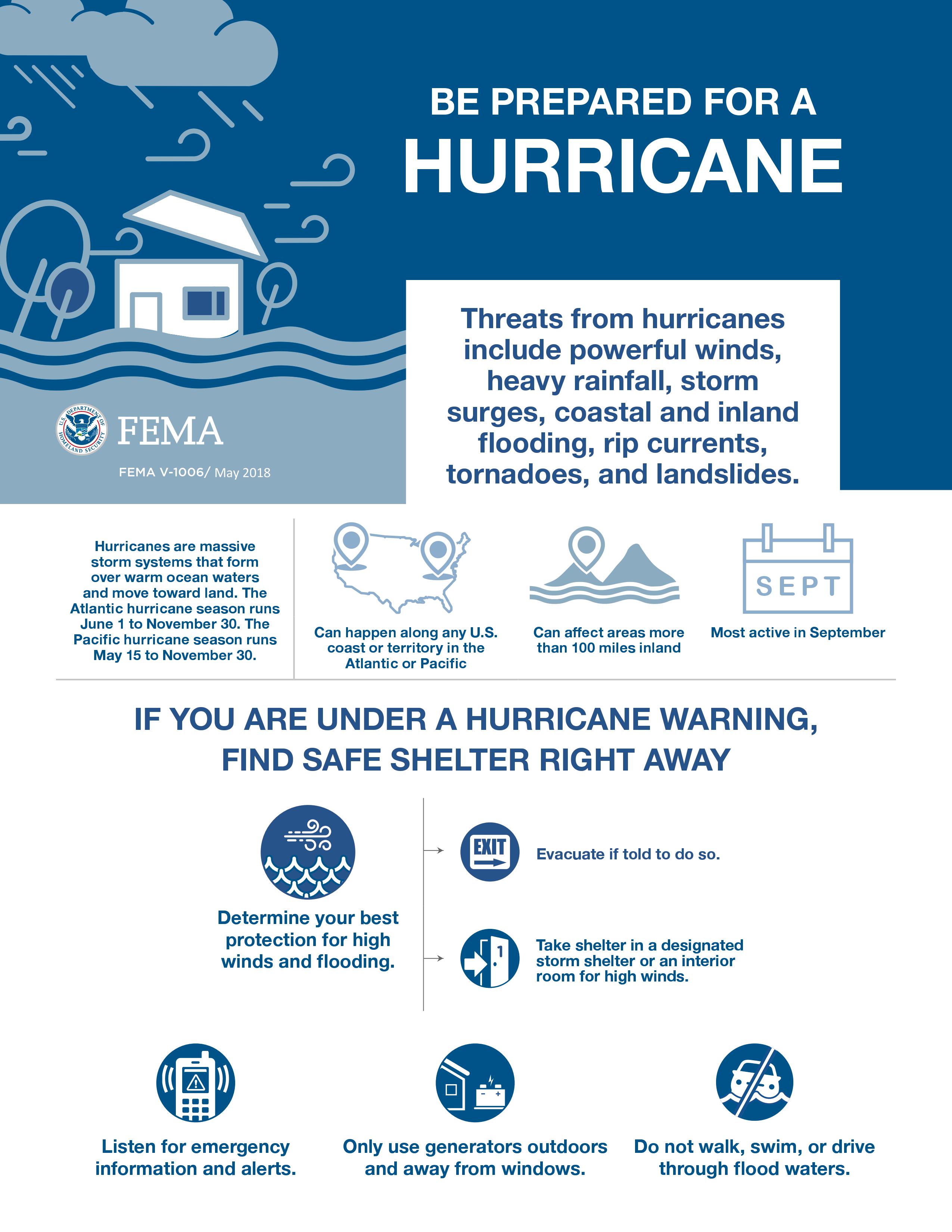
Hurricanes are massive storm systems that form over warm ocean waters and move toward land. The Atlantic hurricane season runs June 1 to November 30. The Pacific hurricane season runs May 16 to November 30.
Threats from hurricanes include powerful winds, heavy rainfall, storm surges, coastal and inland flooding, rip currents, tornadoes, and landslides.
- Can happen along any U.S. coast or territory in the Atlantic or Pacific.
- Can affect areas more than 100 miles inland.
- Most active in September
If you are under a Hurricane Warning, Find Safe Shelter Right Away
Determine your best protection for high winds and flooding.
- Evacuate if told to do so.
- Take shelter in a designated storm shelter or an interior room for high winds.
Listen for emergency information alerts.
Only use generators outdoors and away from windows.
Do not walk, swim or drive through flood waters.
How to Stay Safe When A Hurricane Threatens
Prepare Now
- Know your area's risk for hurricanes.
- Sign up for your community's warning system. The Emergency Alert System (EAS) and National Oceanic and Atmospheric Administration (NOAA) Weather Radio also provide emergency alerts.
- If you are at risk for flash flooding, watch for signs such as heavy rain.
- Practice going to a safe shelter for high winds, such as a FEMA safe room or ICC 500 storm shelter. The next best protection is a small, interior, windowless room in a sturdy building on the lowest level that is not subject to flooding.
- Based on your location and community plans, make your own plans for evacuation or sheltering in place.
- Become familiar with your evacuation zone, the evacuation route, and shelter locations.
- Gather needed supplies for at least three days. Keep in mind each person’s specific needs, including medication. Don’t forget the needs of pets.
- Keep important documents in a safe place or create password-protected digital copies.
- Protect your property. Declutter drains and gutters. Install check valves in plumbing to prevent backups. Consider hurricane shutters. Review insurance policies.
Survive During
- If told to evacuate, do so immediately. Do not drive around barricades.
- If sheltering during high winds, go to a FEMA safe room, ICC 500 storm shelter, or a small, interior, windowless room or hallway on the lowest floor.
- If trapped in a building by flooding, go to the highest level of the building. Do not climb into a closed attic. You may become trapped by rising flood water.
- Listen for current emergency information and instructions.
- Use a generator or other gasoline-powered machinery ONLY outdoors and away from windows.
- Do not walk, swim, or drive through flood waters. Turn Around. Don’t Drown.® Just six inches of fast-moving water can knock you down, and one foot of moving water can sweep your vehicle away.
- Stay off bridges over fast-moving water.
Be Safe After
- Listen to authorities for information and special instructions.
- Be careful during clean-up. Wear protective clothing and work with someone else.
- Do not touch electrical equipment if it is wet or if you are standing in water. If it is safe to do so, turn off electricity at the main breaker or fuse box to prevent electric shock.
- Avoid wading in flood water, which can contain dangerous debris. Underground or downed power lines can also electrically charge the water.
- Save phone calls for emergencies. Phone systems are often down or busy after a disaster. Use text messages or social media to communicate with family and friends.
- Document any property damage with photographs. Contact your insurance company for assistance.
Take an Active Role in Your Safety
Go to ready.gov and search for hurricane. Download the FEMA app to get more information about preparing for a hurricane.
Download PDF